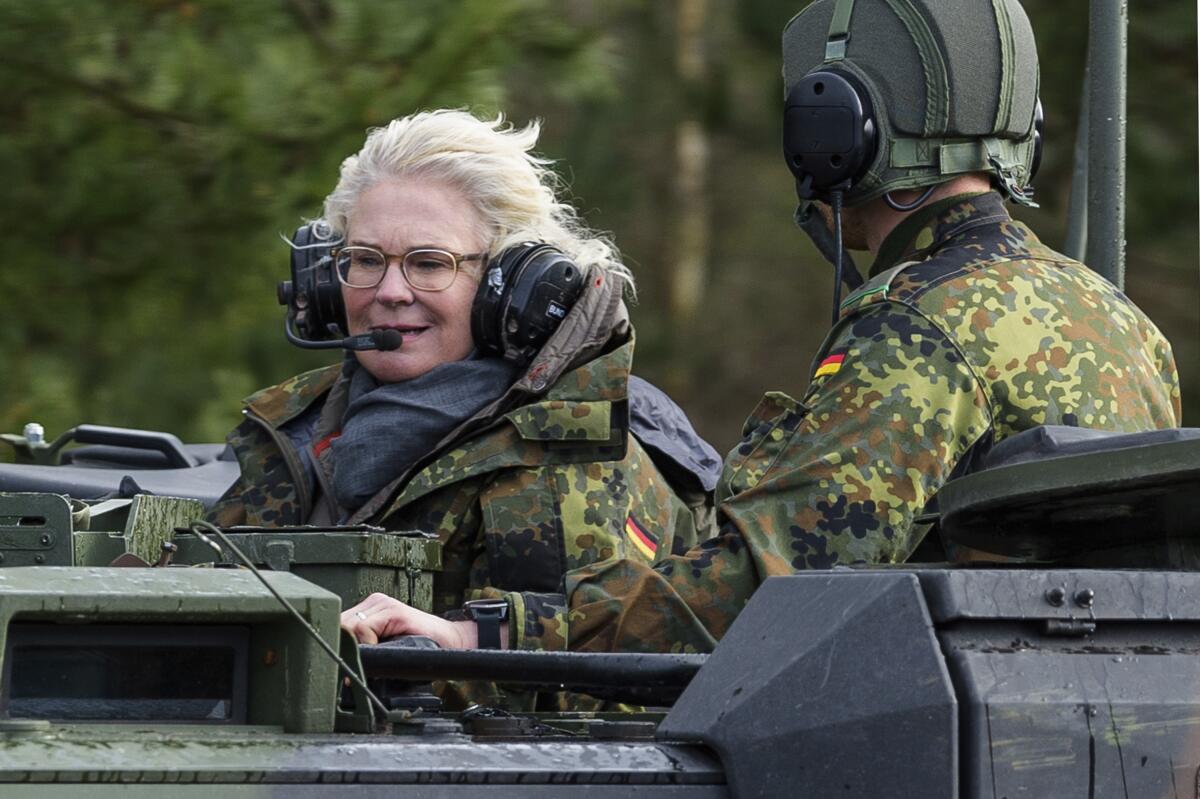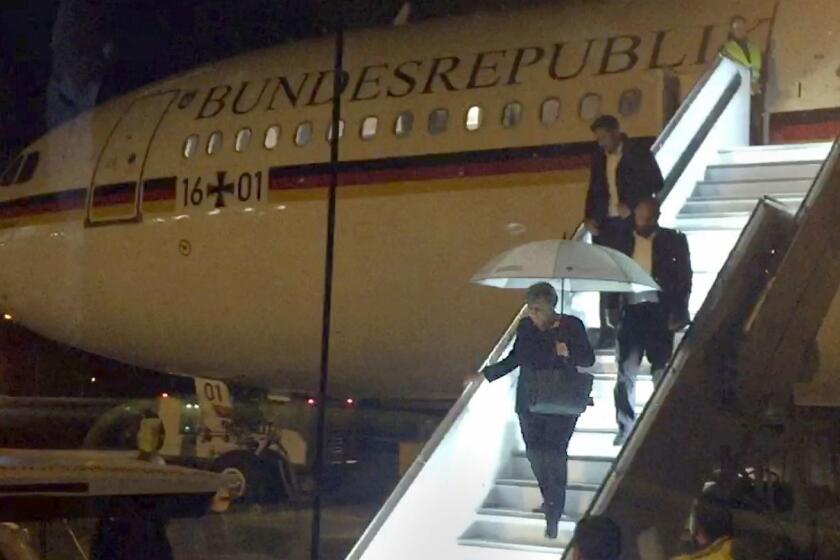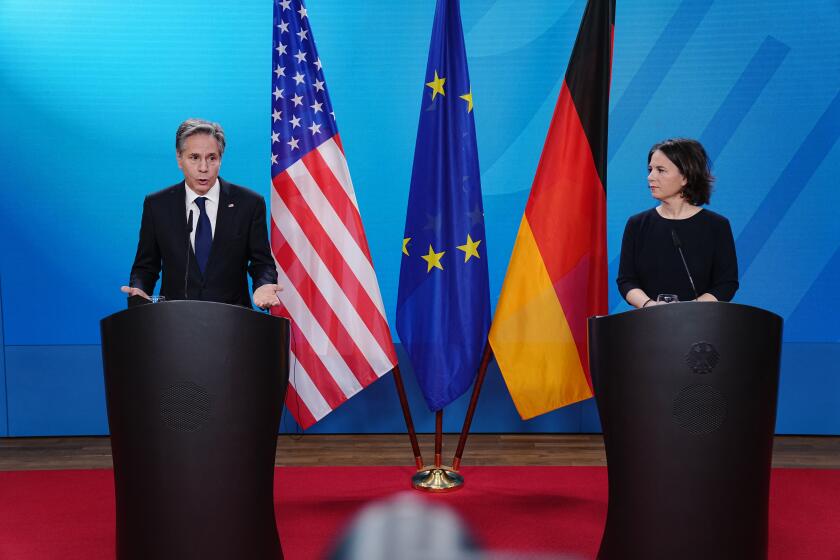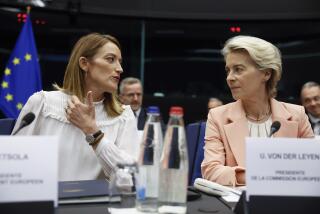Germany’s defense minister resigns amid heavy criticism over Ukraine

BERLIN — Germany’s much-criticized defense minister announced her resignation Monday following a series of missteps while her department steers the massive project of modernizing the country’s military and oversees expanding weapons deliveries to Ukraine.
Christine Lambrecht said in a statement that she had submitted her resignation request to Chancellor Olaf Scholz, adding that “months of media focus on my person” had stood in the way of a factual debate about the military and Germany’s security policy.
“The valuable work of the soldiers and many people in my department must stand in the foreground,” she said.
Scholz thanked Lambrecht for her work in difficult times, saying he had “great respect” for her decision.
He declined immediately to say who would replace her but indicated that this would happen soon.
The new minister will quickly be thrown into the deep end in their new job. U.S. Defense Secretary Lloyd J. Austin III is scheduled to visit Berlin this week and then host a meeting of allies at the Ramstein Air Base in western Germany. On Sunday, the German and French governments will hold bilateral talks that include a meeting of the countries’ joint security council.
“I know from my perspective how things should proceed and we will announce that in due time too,” said Scholz.
A government spokesperson, Christiane Hoffmann, said earlier Monday that it was important to Scholz to ensure gender parity among ministers, but declined to comment on a possibility of a wider Cabinet reshuffle.
The 57-year-old Lambrecht had been defense minister since Scholz became chancellor in December 2021. Critics have long portrayed her as out of her depth, but Scholz stood by her, describing her last month as “a first-class defense minister.” Pressure on her mounted recently after an ill-judged New Year’s video message.
Lambrecht’s resignation comes at a sensitive moment, as Scholz faces mounting pressure to take another significant step in German military aid to Ukraine by agreeing to deliver Leopard 2 battle tanks. Earlier this month, Germany agreed to provide 40 Marder armored personnel carriers and a Patriot air-defense missile battery to Kyiv.
German Chancellor Angela Merkel had taken off for an international meeting in Buenos Aires in November when the electronics systems on her Luftwaffe jet abruptly failed, forcing the pilot of the 20-year-old government craft to make an emergency landing in Cologne and Merkel to switch to a commercial flight.
Germany has given Ukraine substantial support in recent months, including howitzers, Gepard self-propelled anti-aircraft guns and the first of four IRIS-T surface-to-air missile systems. But critics, some inside Germany’s governing coalition, have long complained of Scholz’s perceived hesitancy to step up aid. Lambrecht was overshadowed on the issue by the chancellor, who made most major announcements.
Lambrecht was Scholz’s deputy when he was finance minister. She was appointed justice minister in 2019. She also served as minister for families and women in the closing months of then-Chancellor Angela Merkel’s government.
She was respected in those roles but was widely viewed as one of the Scholz government’s weakest links at the Defense Ministry.
The notoriously unwieldy department has a history of diminishing ministers’ reputations.
As the U.S. seeks to present a united front on Ukraine, Germany has its own interests to safeguard in dealings with the Kremlin. Some other European states do as well.
The ministry’s importance increased with Russia’s invasion of Ukraine. That prompted Scholz to announce a special $108-billion fund to upgrade the German military, the Bundeswehr, which has suffered for years from neglect and in particular from aging, poorly functioning equipment.
Last month, Lambrecht dismissed suggestions that the government had been too slow to get going on its spending drive. She said that officials have moved fast but that “such projects must be carefully negotiated — this is tax money.”
The minister also drew criticism for hapless communication, starting with a January 2022 announcement that Germany would deliver 5,000 military helmets to Ukraine as “a very clear signal that we stand by your side.”
In April, she took her 21-year-old son along on a military helicopter flight, which became public when he posted a photo on Instagram that it turned out Lambrecht had taken herself. Her ministry said she had applied for permission and paid the costs herself, but critics said it showed poor judgment.
Surging inflation and fears about an energy crisis from Russia’s ongoing war in Ukraine are taking a toll on the finances — and psyches — of Germans.
An amateurish New Year’s video message on her own private Instagram account prompted new opposition calls for Lambrecht’s departure and strained political allies’ patience.
It showed a barely audible Lambrecht speaking against a backdrop of loud New Year’s Eve fireworks in a Berlin street.
“A war is raging in the middle of Europe,” she said. “And connected with that for me were a lot of special impressions that I was able to gain — many, many meetings with interesting, great people.”
More to Read
Sign up for Essential California
The most important California stories and recommendations in your inbox every morning.
You may occasionally receive promotional content from the Los Angeles Times.













